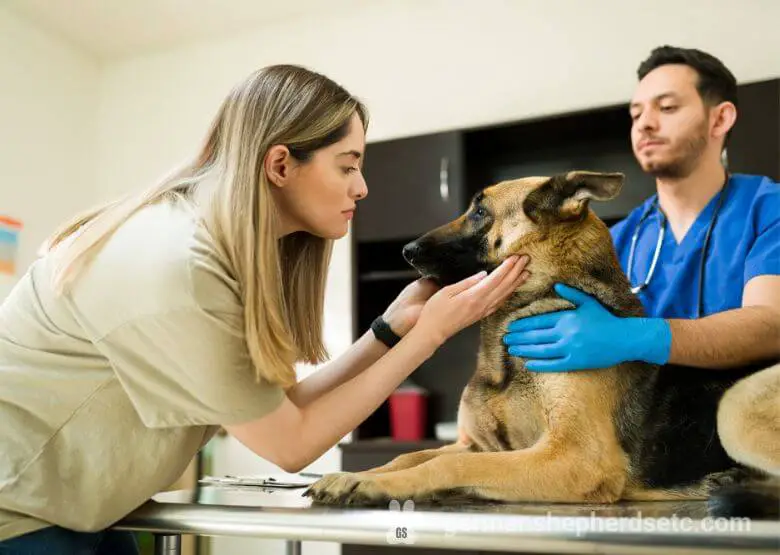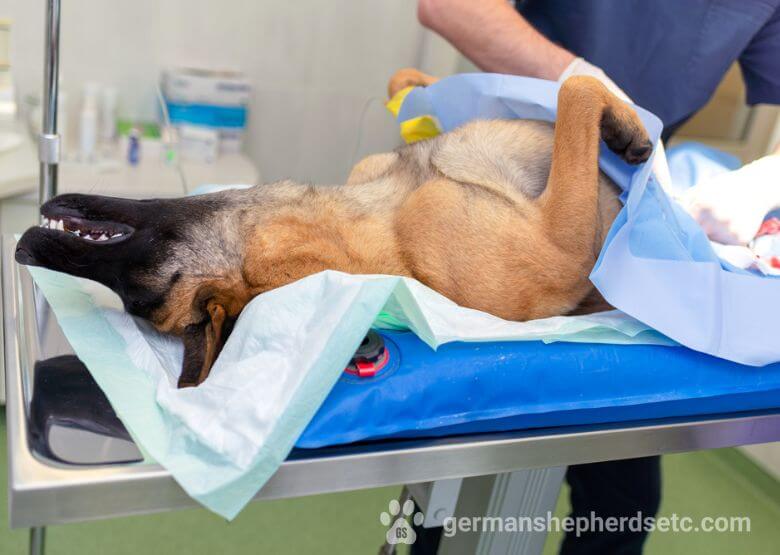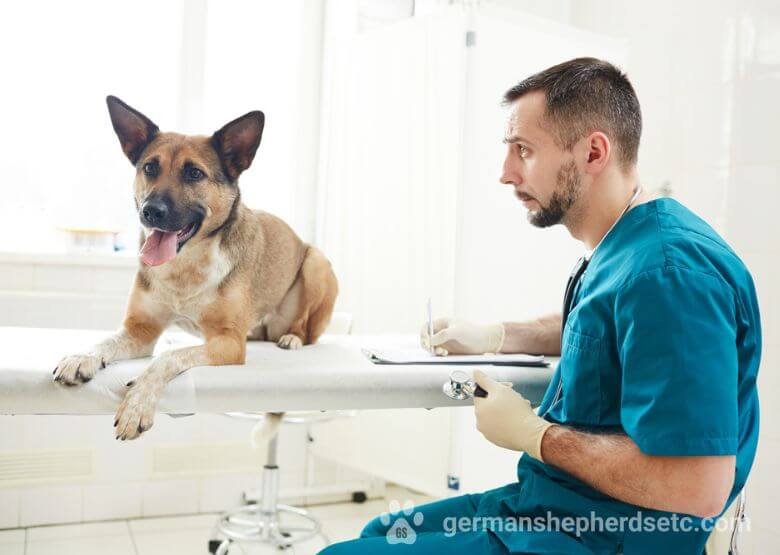Table of Contents
Spaying or neutering a German Shepherd is a responsible decision, and you need to know all pros and cons of it. It’s up to you to decide when to do it, though the common consensus says that it should be done for sure to avoid hormonal-related behavioral problems, like wandering off, unwanted litter, and aggression.
Another generally accepted idea is that this procedure should be done when your dog is at least 1 year old to reduce the risk of joint disorders and specific types of cancer.
You may also be confused about the procedure because there is a lot of bias about it. That is why it is important to discuss all the nuances. That’s what we are going to do right now.
Why Do You Need to Neuter Your German Shepherd?
The main recommendation from public animal well-being groups is that neutering or spaying a German Shepherd is a must if you are not going to become a breeder. The ASPCA, the Human Society, representatives of animal shelters, and animal rescue groups strongly advocate it to avoid the extension of the stray animals’ population, their sufferings, and undesired anti-sanitation consequences of overpopulation. The animal rescue system is always worried about the growing number of unwanted dogs and the need to euthanize them because they often do not have space and costs for keeping such a number of animals.
Therefore, even if neutering Shepherds is not a mandatory procedure, you have to think about the consequences of your decision to leave everything as it is and give a start to numerous health problems, behavioral issues, and other sorts of disorders.
Let’s consider the main reasons why your doggy should be spayed or neutered.
- Behavioral Issues
The German Shepherd’s neutering behavior differs greatly from the dogs that haven’t undergone this procedure. It is especially important for male GSDs. They often develop aggressive behavior, including ‘leg humping.’ It is very uncomfortable when your doggy tries to do it to your guest.
- Genetic Diseases
A lot of genetic diseases spread because of irresponsible breeding. The occasional mating can lead to the appearance of more animals with negative genes and a disposition to certain disorders. Such unpleasant conditions as cryptorchidism or hip dysplasia can be a result of unwanted offspring. If you know that your pup has a genetic condition that can lead to its disease, neutering is obligatory.
- Cancer of Testiculars
This bad disease appears in unneutered dogs under the influence of testosterone. Neutering eliminates the risk of such a condition and prolongs your pet’s life.
- Perineal Hernias
Dogs often suffer from pelvic hernias if they are intact. Over the years, the dog’s abdomen organs can herniate through the pelvic muscles and fill with fat or fluids. You can prevent such a condition by neutering or spaying.
- Unwanted Pregnancies
An intact male dog can smell a female in heat anywhere, and you will always be in trouble while walking with such a dog. It can become uncontrolled, and you cannot avoid mating and getting litter if your doggy is not neutered or spayed.

- Life-Threatening Accidents and Injuries
Your intact German Shepherd will constantly look for females to mate with. It can escape from its enclosure and wander away. So, the dog may face the danger of being hit by a car or encountering another intact male dog hunting for a female. Serious injuries that result from the fight can be life-threatening, and car crashes are often fatal for the animal.
- Getting Lost
Your male doggy will be searching for a female in the heat without seeing anything around. So, it will not care where it is and how to get back home. In this case, it won’t be able to find its way back home and get lost. If it is not microchipped, finding your pet will be impossible.
- Overpopulation
There are too many shelters nowadays, and despite their number, they cannot host all the incoming dogs. Even the “no-kill” shelters can change their policies and euthanize the animals because they do not have enough room and funds to keep them. If you neuter or spay your dog, you will reduce overpopulation and give other abandoned dogs a chance to survive and be adopted to a good home to those dogs brought to the shelter due to some tragic circumstances.
- “Marking”
The smell of marking is awful, and it stays with you wherever you go. If the dog is neutered, it does not mark the territory.
- Prostate Issues
Dogs can suffer from prostate disease like humans. They develop prostate enlargement, abscesses, and cysts. Neutered dogs do not suffer from these conditions.
Therefore, you can see now why neutering and spaying German Shepherds is so important.
What Is Neutering a German Shepherd?
Neutering is a general term for both sexes – male and female dogs. When we refer to male dogs, we can also use the term “castration,” while the term “spaying” is used only for female animals. You can also encounter one more term – “fixing” – for both males and females.
Spaying in females is a surgery that is meant to remove the uterus and ovaries or only the ovaries if a dog is young.
There are two ways of doing spaying – open surgery and laparoscopic surgery. Open surgery is a traditional method. It involves an incision used for the removal of the organs. A vet ties off arteries and removes the uterus and ovaries during this surgery. Then, the doctor closes the wound with sutures, staples, or by using special glue.
Laparoscopic surgery is minimally invasive or “keyhole.” The doctor uses a telescopic rod equipped with a lens for it. The rod is inserted into the dog, and the surgeon can follow the procedure on the monitor. The doctor uses carbon dioxide gas to create space in the abdomen to eliminate the organs. The tool with graspers is also inserted for the removal of the ovary. Then, the cauterizing instrument is applied to seal the cuts, and there are no sutures needed. The procedure is not lengthy and painful for the dog, and the German Shepherd’s spay recovery is faster. General anesthesia is used in both surgeries, so your girl will be fast asleep during the procedure.

Neutering for male dogs involves removing the testicles, which is much simpler than for females. The vet isolates the testicles and then makes a small cut over the place of their location. This incision should be large enough for a testicle to be taken through it. Then, the doctor pulls the testicles through the cut, takes the measures to prevent bleeding, and then cuts the testicles off. Each testicle is taken off separately. After the procedure is completed, the surgeon sutures up the bottom and top layers of the skin.
Since this procedure is not too complicated, the German Shepherd’s neuter recovery time is short. The sutures dissolve and fall apart within a few days, and the doggy is well again.
Pros and Cons of Neutering (Spaying) a German Shepherd
Sure, you need to consider all the pros and cons before making a decision about neutering or spaying your German Shepherd. So, let’s have a closer look at them.
Pros of Neutering a GSD
Among the most obvious benefits, we can name the following:
- Increased life expectancy. Recent research shows that among all German Shepherds in Georgia (USA), neutered Shepherds live for an average of 9.4 years, while non-fixed dogs live for only 7.9 years on average. The life expectancy in males has increased by 13.8% with neutering.
- Decreased number of health issues. Sterilization decreases the risk of death from infections, though the number of deaths from some forms of cancer may increase.
- Elimination of non-cancerous prostatic hyperplasia. Though this enlargement of the prostate is non-life threatening, it can be painful and uncomfortable for aging dogs.
- Reduction of the risk of perineal hernia decreases. Often the pelvic diaphragm gets weaker, and the organs protrude into the anus area. While neutered, German Shepherds do not suffer from this condition as a rule.
- Avoiding cancer of the testicles. They are removed so testosterone levels decrease and do not cause specific types of cancer.
- No bad traumas or accidents. Roaming is a dangerous phenomenon during the process of sexual maturity. Young male dogs start looking for females and escape from home to track the female’s scent. They can be hit by cars or badly damaged in a fight with other males. Fixing can spare this problem.
- Reduction of aggressive behavior. Some canine connoisseurs argue that neutering does not reduce aggression in German Shepherds. However, the study shows that about 62% of male dogs have reduced their aggression towards other animals, though they are still ready to protect their territory. There are different opinions about this point because aggression does not depend on sexual behavior only. Training and socializing play a great role in that, too.
- Prevention of unwanted litter. Shelters are full of German Shepherds, and not all people can adopt these dogs because they need a truly energetic owner. That is why shelters that cannot cope with such a number of animals have to euthanize them. Even if you decide on spaying a German Shepherd after the first heat, be careful about your female doggy not encountering a devoted mate and getting pregnant.
All in all, fixing your Shepherd can save you a lot of money. The procedure can cost between $50 and $250 only. Dealing with problems related to intact dogs will cost you much more. For example, if your pup gets pregnant, you will need a lot of time and effort to find a home for the puppies. Dealing with health issues like testicular cancer or prostate disease is rather costly. The vet bills for fixing traumatic injuries are also very high. Cleaning marking around the house will take a lot of effort. Training will be easier and more cost-effective. The insurance for neutered German Shepherds will not cost you a fortune, either.

Cons of Shepherd Fixing
So you can see that there are many advantages of neutering German Shepherds. However, you may also encounter diverse drawbacks to be aware of. They are the following:
- Lost reproductive ability. Therefore, your pup will not experience the overall sex drive, and its behaviors related to hormonal changes will differ.
- The increased risk of joint disorders. If neutering or spaying is performed too early, your pup may suffer from hip dysplasia. Doing this procedure before age one leads to 21% of male Shepherds with different joint problems.
- Developing different types of cancer. While the risk of testicular cancer in males decreases, other cancers may develop, especially in females. For example, hemangiosarcoma is common in 5% of spayed or neutered Shepherds.
- Risk of immune-mediated disease, known as hemolytic anemia. Dogs can be lethargic and weak and do not want to run and play.
- Risk of getting dementia. You can notice cognitive decline displayed by anxiety, circling, decreased learning, forgetfulness, getting lost, house accidents, lethargy, vocalizing, sleep disorders, and wandering.
- Changes in the quality of the coat. The appearance and texture alter, especially in long-haired Shepherds. The hair gets longer and thinner.
- Risk of hyperthyroidism. The number of thyroid hormones in the dog’s body increases, and it leads to metabolic changes, hyperactivity, thirst, excess appetite, urination issues, and immense weight loss.
In general, spaying or neutering a German Shepherd is a surgery, and it bears small risks. Complications may happen in 0.1-2% of all dogs without any fatal consequences, but you need to know about that.
FAQ
When to spay a German Shepherd?
The common opinion is that spaying or neutering a German Shepherd should be done before the dog reaches maturity. That allows for preventing early mating and avoiding unwanted litter and overpopulation. Dog owners and many specialists also believe that early spaying or neutering can prevent aggression and other undesired behaviors. However, recent research has proven that early neutering/spaying leads to bad joint disorders in the future. So, the ideal time for this surgery is about one year of age for both males and females.
Do German Shepherds calm down after neutering?
Yes, your German Shepherd will calm down in about 3-4 weeks after neutering. It will be far less likely to show sexually-related behaviors, such as humping your leg or furniture and mounting other dogs. It will also become less aggressive to male dogs, and your family members and other people will not be so influenced by it. Your doggy will become more docile and obedient. However, its personality won’t change much, so it may still display aggression to strangers, motivated by the drive to protect its home. If it were friendly and obedient before neutering, it would be the same after it.
Does neutering help with aggression in German Shepherds?
To some extent, yes. Neutering can help reduce aggression toward other males related to sexual behavior. However, scientific research has shown that neutering or spaying is not an effective strategy for reducing aggression in German Shepherds. This procedure does not influence the dog’s reaction to new circumstances, environments, or possible threats. On the contrary, the researchers have noticed a small increase in male dogs’ aggression toward strangers after neutering. So, proper training and teaching obedience techniques can help overcome this aggression and make your doggy more aloof and cold-tempered.
How much does it cost to neuter a German Shepherd?
The cost of this surgery depends on where the procedure is performed, so it can range between $35 and $300 to neuter your male dog. Spaying a female is a more complicated procedure that can cost between $50 and $150 at a shelter or low-cost clinic and up to $200-$350 if performed by a private veterinarian.
Final Thoughts – Consider All Pros and Cons
In general, spaying or neutering a German Shepherd is not an easy decision. It should be responsible and well-elaborated. You need to know all pros and cons of this surgery. So, you have to do some research. All in all, the benefits outweigh the drawbacks. However, it’s up to you to consider this procedure for your pet.
Remember that neutering and spaying are irreversible, so make an informed decision by understanding the procedure and its consequences. You also have to learn more about the connections between German Shepherd spaying and aggression because there are different opinions on this point. If you want your doggy to be less aggressive, this motivation is not enough for a positive decision on the procedure. That is why you need to learn more about all the nuances, pros, and cons of this surgery and decide how beneficial it will be for your dog and your family.
